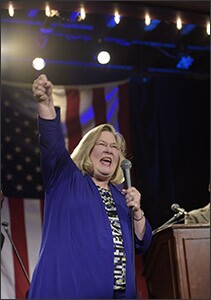In the week after the election, reporters and analysts alike have pored over how the teachers who ran for office fared in the results. According to Education Week’s own analysis, at least 42 current classroom teachers were elected to their state legislatures, while nearly 80 more lost their races.
But how many of those were seasoned incumbents versus fired-up political novices?
Many of the teachers who ran for office—especially in places like Oklahoma, which saw widespread teacher activism in the spring—were inspired to run because of their concerns over low pay and lack of funding for schools in the state. They wanted a chance to join the legislative bodies that make many of those decisions. (Some of those teachers had run for office before, but lost.)

A smaller group of teachers who ran for office this year were already in those legislative bodies. According to an Education Week analysis, 21 of the 120 current K-12 teachers who made it to the general election—nearly 18 percent—were incumbents.
Only two of those incumbents lost on Nov. 6, and both were in New York state. Reps. Erik Bohen and Christine Pellegrino, who were both previously elected in special elections in 2018 and 2017, respectively, lost their bids for a full term. Pellegrino is a Democrat, and Bohen ran in the special election as a conservative Democrat but switched his party to Republican in the midterm election.
Of the 99 non-incumbents who ran for state legislature while currently teaching, most of them—61 teachers—ran against people who were already in the legislature. Some of these teachers, especially those in states that experienced teacher walkouts in the spring, criticized their opponents’ rhetoric about teacher pay and school funding during the campaign.
But the odds were stacked against those teachers: 50 non-incumbent teachers who ran against incumbents lost their races. Just nine teachers won, and three of them were running in a multi-member legislative district.
It’s worth noting that two other teachers who ran against incumbents have not yet received a final vote tally. Christine Marsh, a high school English teacher is Arizona, challenged Republican state Rep. Kate Brophy McGee, and Mary Edly-Allen, a teacher of English-language learners in Illinois, ran against Republican state Rep. Helene Miller Walsh (who was appointed to the seat earlier this year, replacing a representative who resigned in the wake of a scandal). Both of those races are still too close to call.
For a breakdown of the gender, political party, and geographic location of the teachers who ran for office, see this infographic. And to learn more about how teachers fared in the election, check out this Facebook Live conversation.
Education Week Librarian Maya Riser-Kositsky contributed to this analysis.
Photo: Oklahoma state Rep. Karen Gaddis, a retired teacher, leads the crowd in chanting “keep it up” after giving her concession speech during the Democratic watch party on Nov. 6 in Tulsa, Okla. —Brandi Simons for Education Week
